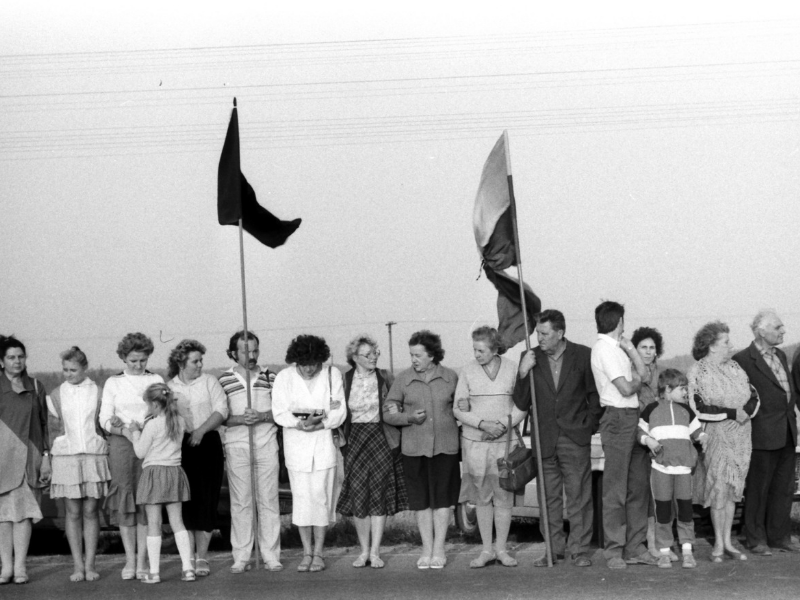We knew it already but the government’s actions underline it: the mass removal of trees at Santa Luċija and Attard raises important issues of justice. The government’s spin can’t help reveal the stakes.
When the spin says that wider roads in Attard mean less air pollution, the aim is to paint the protesting residents as undermining their own self-interest. The out-of-town activists, it’s implied, are anti-health.
It’s all a rhetorical trick of course. The air only improves if the current volume of traffic remains unchanged; experience shows that wider roads are soon followed by higher volumes of traffic. The air quality will improve only momentarily.
The downside to the trick is that it shows that justice for the residents is a real issue. It’s no longer just about the trees.
Other tricks have been used with Santa Luċija. The local council was not transparent about the real plan. Now, the Minister tells the residents the deadline for objections has passed; their protests are not in line with “the rule of law”.
An NGO, Flimkien Għal Ambjent Aħjar (FAA), had objected but the Planning Authority ignored those objections because FAA is a “third party”. This enables the minister, Ian Borg, to say that “nobody” had objected.
It’s official: third parties are a “nobody”. If an NGO wants to be “somebody” it needs to organise itself into several splinter groups and dissipate its resources.
Government operates as a centralised power, with local government following the line of national party bosses. But NGOs will need to be literally fragmented.
It all rides roughshod over subsidiarity and civil society. The Minister, like his government, misuses the term ‘rule of law’. It’s not about governing according to legal rules (even Vladimir Putin does that). It’s about rules of good government.
But the Minister mentioned rule of law because it’s in play. At stake is the use of law as a framework of democratic consultation. Instead, the law is being weaponised by government against its own citizens.
We need to recognise that justice lies at the heart of this. We need to think carefully about how to make others see that their rights are at stake as well. Right now, the actions being taken – by residents and activists – are admirable; but they’re still vulnerable to being framed in a misleading way by government spin.
There is an international repertoire for protests at the mass removal of trees. Tree-climbing, chaining yourself to a tree, camping across areas destined for the chop… All these have occurred across the world in the face of commercial logging, new airport runways, and so on.
They are usually associated with environmental activists or lone heroes. Which also means that it’s often easier, for corporate or government spinners, to portray them as radicals or eccentrics against progress, unable to strike the right balance between development and environmental concerns.
The Maltese case is being treated similarly. That doesn’t mean that the current activities should stop. But they should be complemented by symbolic actions taken in favour of raising awareness, showing solidarity and standing up for freedom.
More expansive action – representing solidarity and civic presence – should also be contemplated. There are few better models than the Baltic Chain (or Baltic Way).
Thirty years ago this month, citizens of Lithuania, Latvia and Estonia formed an uninterrupted human chain connecting the capitals of the three countries. For 15 minutes, at 7pm of Wednesday, 23 August, around two million people held hands, and candles, while church bells rang.

Baltic Way, Lithuania, 23 August 1989. Photo: Rimantas Lazdynas/Wikimedia Commons
Even today, the photos and film footage are still moving. People of all ages and classes, urban and rural, stood in quiet dignity. They were standing up (literally) to the Soviet occupation. With one simple gesture, they expressed both solidarity and freedom.
In less than a year, they had won independence. It was a quiet revolution. It’s still celebrated today.
The Baltic Chain didn’t just happen of its own accord. It was voluntary but organised. The streets used were carefully mapped. The numbers of people needed for each street were calculated. Street leaders were delegated to make sure the right numbers showed up, organising transport where necessary.
It should be said that the national authorities (including the national Communist parties) approved the plans, even though Moscow’s news agency continued to wage an intimidating propaganda war. Traffic was stopped, buses were used to transport some participants, special leave was granted by many employers.
Should something like this be organised in Malta, it must be assumed that the authorities will not be so helpful. The propaganda war will be waged and under-the-radar tactics will be used.
But imagine, if only for a moment, what a Malta Chain in favour of the environment would mean.
People will stand where the trees should be. People will light a candle to a country with roots. They will be saying that where the environment is concerned, there are no third parties. There is no us and them. We’re all affected.
People wouldn’t be chained to trees. They would be chained to each other: a human chain of freedom and solidarity.
Now, snap out of the reverie and think of two things.
First, do you think that it’s just not possible to do in Malta today what was possible under Communist control 30 years ago? In that case, what does it say about the state of freedom and justice?
Second, if it is possible, then why not do it? And if not now, when?
ranierfsadni@europe.com












